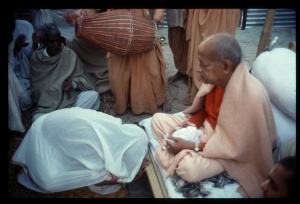CC Adi 14.90: Difference between revisions
m (1 revision(s)) |
No edit summary |
||
| Line 1: | Line 1: | ||
{{ | [[Category:Sri Caitanya-caritamrta - Adi-lila Chapter 14|C090]] | ||
<div style="float:left">'''[[Sri Caitanya-caritamrta|Śrī Caitanya-caritāmṛta]] - [[CC Adi|Ādi-līlā]] - [[CC Adi 14|Chapter 14: Lord Caitanya's Childhood Pastimes]]'''</div> | |||
<div style="float:right">[[File:Go-previous.png|link=CC Adi 14.89|Ādi-līlā 14.89]] '''[[CC Adi 14.89|Ādi-līlā 14.89]] - [[CC Adi 14.91|Ādi-līlā 14.91]]''' [[File:Go-next.png|link=CC Adi 14.91|Ādi-līlā 14.91]]</div> | |||
{{CompareVersions|CC|Adi 14.90|CC 1975|CC 1996}} | |||
{{RandomImage}} | |||
==== TEXT 90 ==== | ==== TEXT 90 ==== | ||
<div | <div class="verse"> | ||
ei-mate duṅhe karena dharmera vicāra | :ei-mate duṅhe karena dharmera vicāra | ||
viśuddha-vātsalya miśrera, nāhi jāne āra | :viśuddha-vātsalya miśrera, nāhi jāne āra | ||
</div> | </div> | ||
| Line 12: | Line 16: | ||
==== SYNONYMS ==== | ==== SYNONYMS ==== | ||
<div | <div class="synonyms"> | ||
ei- | ''ei-mate''—in this way; ''duṅhe''—both of them; ''karena''—do; ''dharmera''—of religion; ''vicāra''—consideration; ''viśuddha''—unalloyed; ''vātsalya''—parental affection; ''miśrera''—of Jagannātha Miśra; ''nāhi''—there is not; ''jāne''—he knew; ''āra''—anything else. | ||
</div> | </div> | ||
| Line 19: | Line 23: | ||
==== TRANSLATION ==== | ==== TRANSLATION ==== | ||
<div | <div class="translation"> | ||
In this way Jagannātha Miśra and the brāhmaṇa discussed the principles of religion in the dream, yet Jagannātha Miśra was absorbed in unalloyed parental mellow and did not want to know anything else. | In this way Jagannātha Miśra and the brāhmaṇa discussed the principles of religion in the dream, yet Jagannātha Miśra was absorbed in unalloyed parental mellow and did not want to know anything else. | ||
</div> | </div> | ||
| Line 26: | Line 30: | ||
==== PURPORT ==== | ==== PURPORT ==== | ||
<div | <div class="purport"> | ||
In Śrīmad-Bhāgavatam ([[SB 10.8.45]]) it is said, “Lord Kṛṣṇa, the Supreme Personality of Godhead, who is worshiped with exalted hymns by all the Vedas and Upaniṣads and by great personalities through sāṅkhya-yoga in the mode of goodness, was considered by mother Yaśodā and Nanda to be their own little son.” Similarly, Jagannātha Miśra also considered Lord Caitanya Mahāprabhu his beloved little boy, although He is worshiped with all veneration by learned brāhmaṇas and saintly persons. | In [[Srimad-Bhagavatam|''Śrīmad-Bhāgavatam'']] ([[SB 10.8.45]]) it is said, “Lord Kṛṣṇa, the Supreme Personality of Godhead, who is worshiped with exalted hymns by all the ''Vedas'' and ''Upaniṣads'' and by great personalities through ''sāṅkhya-yoga'' in the mode of goodness, was considered by mother Yaśodā and Nanda to be their own little son.” Similarly, Jagannātha Miśra also considered Lord Caitanya Mahāprabhu his beloved little boy, although He is worshiped with all veneration by learned ''brāhmaṇas'' and saintly persons. | ||
</div> | </div> | ||
__NOTOC__ | |||
<div style="float:right; clear:both;">[[File:Go-previous.png|link=CC Adi 14.89|Ādi-līlā 14.89]] '''[[CC Adi 14.89|Ādi-līlā 14.89]] - [[CC Adi 14.91|Ādi-līlā 14.91]]''' [[File:Go-next.png|link=CC Adi 14.91|Ādi-līlā 14.91]]</div> | |||
__NOTOC__ | |||
__NOEDITSECTION__ | |||
Revision as of 07:19, 18 July 2021

A.C. Bhaktivedanta Swami Prabhupada
TEXT 90
- ei-mate duṅhe karena dharmera vicāra
- viśuddha-vātsalya miśrera, nāhi jāne āra
SYNONYMS
ei-mate—in this way; duṅhe—both of them; karena—do; dharmera—of religion; vicāra—consideration; viśuddha—unalloyed; vātsalya—parental affection; miśrera—of Jagannātha Miśra; nāhi—there is not; jāne—he knew; āra—anything else.
TRANSLATION
In this way Jagannātha Miśra and the brāhmaṇa discussed the principles of religion in the dream, yet Jagannātha Miśra was absorbed in unalloyed parental mellow and did not want to know anything else.
PURPORT
In Śrīmad-Bhāgavatam (SB 10.8.45) it is said, “Lord Kṛṣṇa, the Supreme Personality of Godhead, who is worshiped with exalted hymns by all the Vedas and Upaniṣads and by great personalities through sāṅkhya-yoga in the mode of goodness, was considered by mother Yaśodā and Nanda to be their own little son.” Similarly, Jagannātha Miśra also considered Lord Caitanya Mahāprabhu his beloved little boy, although He is worshiped with all veneration by learned brāhmaṇas and saintly persons.